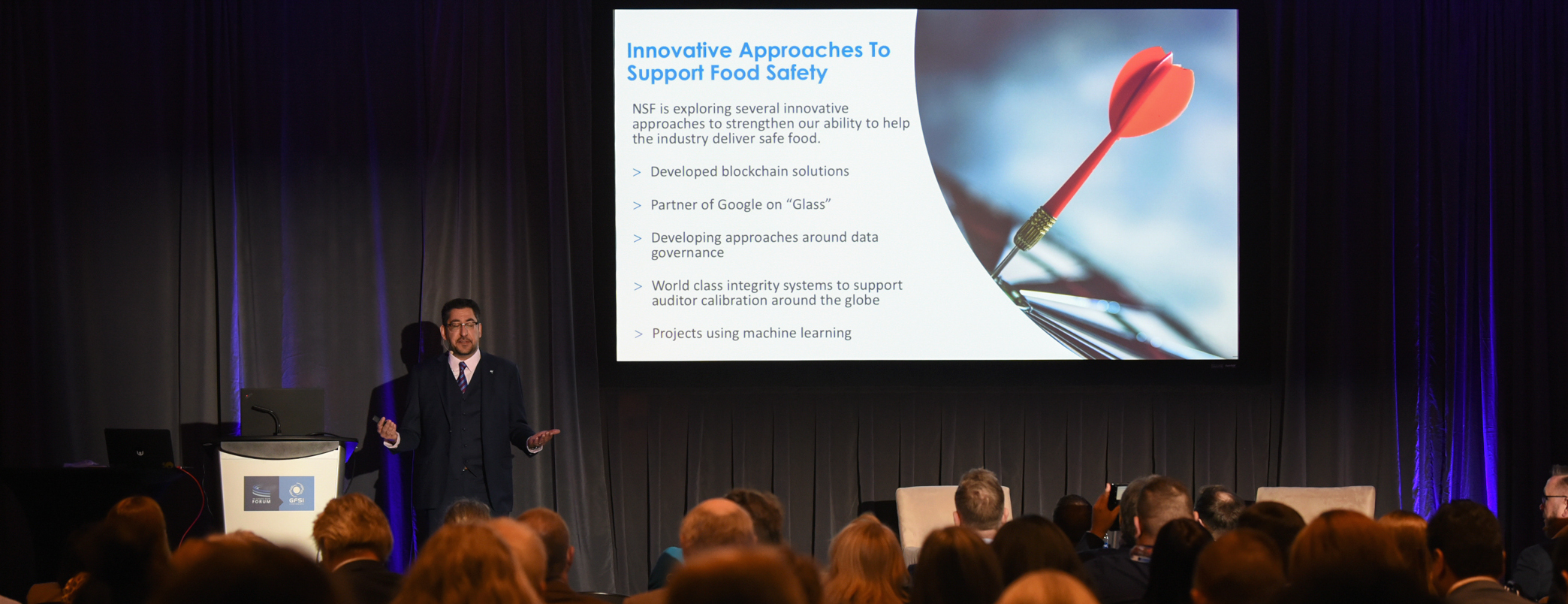This was my first experience at GFSI and, listening to the sessions and in my many interactions with colleagues from around the world, I was struck by how much of what we do is about trust – delivering trust through our food safety work, but just as importantly, being seen to deliver trust through transparency. We see this movement in many of the technology innovations and developments coming on to the market now. NSF’s own GFSI breakfast session this year focused on EyeSucceed, a remote auditing solution and NSF Verify™, a blockchain enabled transparent traceability platform for the protein chain.
In this new reality of COVID-19, it has never been more important to maintain consumer trust. This is true as much for the food industry as for government, institutions, the media and other industry sectors; perhaps more so for the food industry, as it plays such a front-line role in people’s lives and their well-being. Yet, stark figures from this year’s Edelman Trust Barometer that were presented at Davos this year, show how much trust in the food industry has eroded in recent years.
Through the 20 years that Edelman, the global communications organisation, has produced its Trust Barometer – an annual survey of 10,000 respondents across 10 markets – the priority issues for people have shifted toward concerns about competence and ethics. People worry about the quality of information they receive and the amount of false information, especially on social media. By and large, government leaders are distrusted, while trust in scientists is high. A special update survey conducted in March this year, specifically to track trust in relation to COVID-19 has, not surprisingly, accentuated this trend. Worryingly, no company is seen as both competent and ethical, although they may been seen to have some of these features. However, business performs better on these axes than media, NGOs and government.
Now with COVID-19 we see panic buying because people don’t trust that the industry and government can ensure an uninterrupted supply of food. What can we do about this?
Michele O’Neill, Global Strategy Director of Edelman, addressed NSF staff and clients at our annual UK conference, and had three important messages for business leaders. First, you must do the right thing, which means taking the long-term view and doing right by customers, employees and communities, not just shareholders. It also means not just making commitments but taking tangible action. Secondly, partnering with government and NGOs is a good idea, because the public does not trust any one institution very highly, but by combining the good aspects of each you will be stronger together, with the right combination of competence and ethics to make change happen. Finally, and very importantly in this current situation, lead from the top of your organisation. It is important for business leaders to share their opinions on the important issues of the day. Let people know that you care, you have their backs and are doing the right thing as an organisation.
I would add to that the crucial need to pay attention to the health of your corporate culture. Employees need to feel fairly and justly treated and engaged in the organisation if we are to engender trust, engagement and productivity with the right behaviours.
There is in all this a huge positive for business leaders at this moment in time. People are looking for information that they can trust and, after doctors, scientists and expert institutions, employees trust their business leaders more than government and the media to provide this. Businesses are trusted to respond effectively to the crisis and have a responsibility to ensure their employees are protected from and do not spread the virus. Employees want regular updates on the position as it affects their health (not business impact), the status of the disease and how they can prepare or respond. Providing this information is critical to the reassurance and well-being of the workforce and to maintain workplace safety and a responsible environment.
Events like GFSI where business leaders from all over the world come together to discuss vital issues in the food industry show us that the direction of travel is right. We certainly care that we get it right and do the right thing. Our food safety systems have never been better and the recognition that healthy corporate cultures deliver the right behaviours is welcome, as is the increasing willingness across supply chains to cooperate to help deliver transparency to consumers.
Are we taking the right paths in our business? Right now is a good time to reflect and take stock. Perhaps the COVID-19 pandemic will have one positive side effect in teaching us all a lot more about what doing the right thing means.
This post was written and contributed by:
Sarah Krol
Senior Global Managing Director
NSF International

